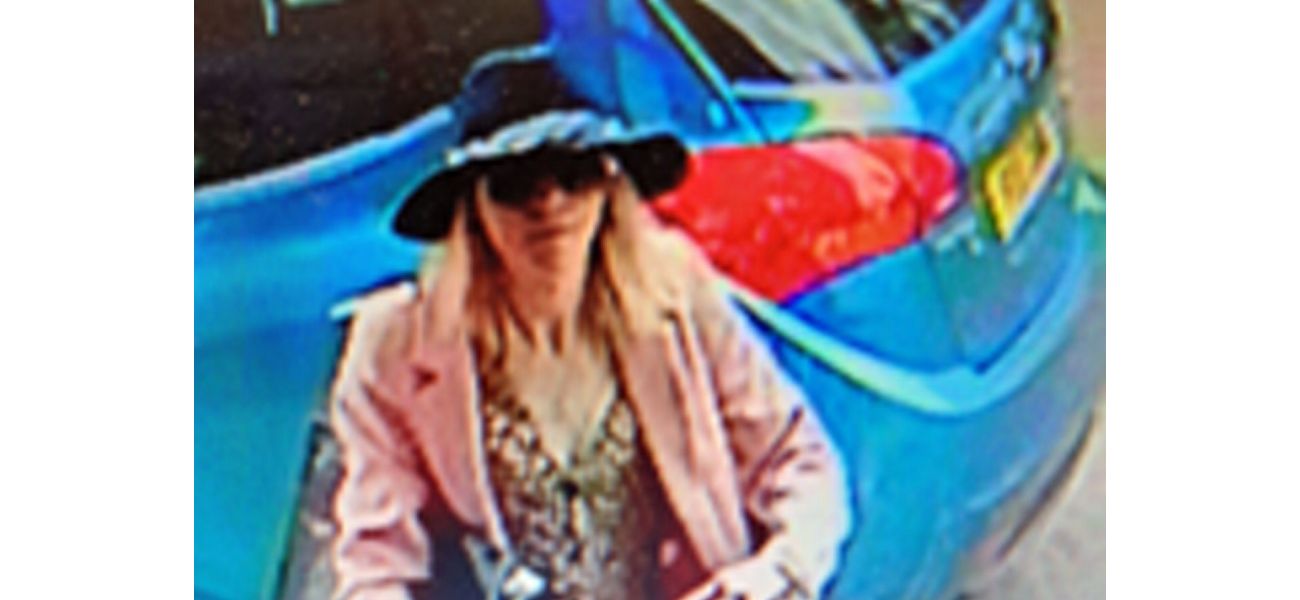A thief with 171 convictions raises questions about the cause of the UK's rising theft rates.
Shoplifting incidents reached record high last year.
September 20th 2024.

Tanya Liddle, a notorious shoplifter from Newcastle, has recently been convicted for the 171st time. The 43-year-old has earned the title of Britain's most prolific shoplifter and has been arrested almost 400 times. She is so well-known among the shopkeepers in her hometown that she has to wear various hats as a disguise when she goes on her stealing sprees. Last April, she was caught on CCTV wearing a large floppy hat while walking out of a TK Maxx store with designer bags worth £1,500.
Due to her continuous criminal behavior, Liddle has now been banned from all shops in the North East, except for a pharmacy, a supermarket, and a clothing store. Northumbria Police took legal action against her and successfully obtained a civil injunction at the Newcastle Civil Court. This is the strictest order they have ever issued against a repeat offender, and if Liddle violates the terms, she could face imprisonment. This action comes at a time when the UK is facing a major shoplifting epidemic.
According to the Office for National Statistics, there were 430,000 recorded cases of shoplifting in the country last year, which is the highest number on record and a 36% increase from the previous year. However, these numbers are believed to be much higher in reality. The British Retail Consortium, which represents most major retail chains, reported losses of £1.8 billion to shoplifting between September 2022 and August 2023, which is a significant increase from the previous year. The rise in shoplifting has also led to a 50% increase in incidents of violence and abuse towards retail staff, with 1,300 cases reported.
One of the most vocal retailers on this issue is the Co-op, which recorded 330,000 incidents of shoplifting, abuse, violence, and antisocial behavior in its 2,500+ stores across the UK last year. This is a 44% increase from the previous year, and the company's director of public affairs, Paul Gerrard, believes that the rise is not due to individuals stealing for themselves, but rather people stealing to resell the products to those struggling to make ends meet, as the cost of living crisis continues.
Criminologist Professor Emmeline Taylor, who conducted a report on the impact of shoplifting on businesses for the Co-op, explains that there are three types of shoplifters. The first group consists of organized criminals who travel from one county to another, stealing in large quantities and then selling the goods at a lower price. Taylor told the Guardian, "Why risk the penalties of drug trafficking when you can just go and target companies up and down the country?" The second group is made up of local prolific thieves who repeatedly target the same stores and sell the stolen items within their community. Recently, there has been a market for everyday products such as laundry detergent and coffee, which are being stolen and resold. The third type is known as the "Swipers," who are opportunistic and may decide not to scan all their items when using self-service tills.
M&S chairman and former Conservative shadow minister Archie Norman believes that this third group is partly responsible for the increase in shoplifting. In an interview with the LBC podcast, "Money with David Buik and Michael Wilson," Norman stated, "It's just too easy to say it's a cost of living problem," and that the culprits are actually middle-class individuals who feel entitled to steal. He added, "A lot of people go in and think, 'Well, this didn't scan or it's very difficult to scan these things through, and I shop here all the time, it's not my fault, I'm owed it.'"
In a report by the Metro, a middle-class mother admitted to shoplifting for "the buzz," and said that self-service tills are the best place to do it. She explained, "You can also put pricier items such as salmon fillets through as onions. I just walk past the security guards and smile. I do feel ashamed, but I know it's not just me." Criminologist Professor Jason Roach from Huddersfield University believes that young people influenced by social media could also be contributing to the spike in thefts, as there is pressure to conform and have the latest products.
Last year, dozens of young people allegedly organized smash-and-grab raids in central London after being influenced by TikTok. This issue is not limited to major retail chains, as smaller, independent businesses are also targeted. According to The Independent, a study by small business insurer Simply Business found that shoplifting is a major concern for small business owners. 57% of respondents reported losing more than £250 to shoplifting in the past year alone.
John Bebbington, the owner of an independent budget store in Bristol, stated, "Shoplifting is pretty horrific at the moment, it's out of control completely." He believes that the rise in incidents is due to the cost of living crisis and the lack of criminal sanctions as a deterrent. He explains, "If you go and pinch something that you really, really want, you're not going to get into trouble, you're not going to get a criminal record, or get arrested. There really is nothing to lose."
In October of last year, the former government launched the Retail Crime Action Plan to tackle the rise in retail theft across the country. The plan includes a commitment from the police to prioritize attending shoplifting incidents that involve violence against shop workers or where security guards have detained an offender. It also provides guidance for retailers on how to provide the best evidence for the police to pursue, such as sending CCTV footage through a digital management system. A specialized police team called Opal was also created to tackle organized shoplifting crime gangs by working closely with retailers. In just three months, the team identified over 152 individuals involved in organized retail crime and facilitated 23 arrests of high-harm offenders.
Assistant Chief Constable Alex Goss, the National Police Chiefs Council lead for Retail Crime, commented, "Police forces have embedded the plan in their operational work, and we've already seen positive results and increased retailer confidence." He added, "This renewed focus, working alongside Opal's highly effective intelligence work in tackling organized retail crime, is showing a marked improvement in our response, dealing robustly with offenders and supporting retailers of all sizes."
Due to her continuous criminal behavior, Liddle has now been banned from all shops in the North East, except for a pharmacy, a supermarket, and a clothing store. Northumbria Police took legal action against her and successfully obtained a civil injunction at the Newcastle Civil Court. This is the strictest order they have ever issued against a repeat offender, and if Liddle violates the terms, she could face imprisonment. This action comes at a time when the UK is facing a major shoplifting epidemic.
According to the Office for National Statistics, there were 430,000 recorded cases of shoplifting in the country last year, which is the highest number on record and a 36% increase from the previous year. However, these numbers are believed to be much higher in reality. The British Retail Consortium, which represents most major retail chains, reported losses of £1.8 billion to shoplifting between September 2022 and August 2023, which is a significant increase from the previous year. The rise in shoplifting has also led to a 50% increase in incidents of violence and abuse towards retail staff, with 1,300 cases reported.
One of the most vocal retailers on this issue is the Co-op, which recorded 330,000 incidents of shoplifting, abuse, violence, and antisocial behavior in its 2,500+ stores across the UK last year. This is a 44% increase from the previous year, and the company's director of public affairs, Paul Gerrard, believes that the rise is not due to individuals stealing for themselves, but rather people stealing to resell the products to those struggling to make ends meet, as the cost of living crisis continues.
Criminologist Professor Emmeline Taylor, who conducted a report on the impact of shoplifting on businesses for the Co-op, explains that there are three types of shoplifters. The first group consists of organized criminals who travel from one county to another, stealing in large quantities and then selling the goods at a lower price. Taylor told the Guardian, "Why risk the penalties of drug trafficking when you can just go and target companies up and down the country?" The second group is made up of local prolific thieves who repeatedly target the same stores and sell the stolen items within their community. Recently, there has been a market for everyday products such as laundry detergent and coffee, which are being stolen and resold. The third type is known as the "Swipers," who are opportunistic and may decide not to scan all their items when using self-service tills.
M&S chairman and former Conservative shadow minister Archie Norman believes that this third group is partly responsible for the increase in shoplifting. In an interview with the LBC podcast, "Money with David Buik and Michael Wilson," Norman stated, "It's just too easy to say it's a cost of living problem," and that the culprits are actually middle-class individuals who feel entitled to steal. He added, "A lot of people go in and think, 'Well, this didn't scan or it's very difficult to scan these things through, and I shop here all the time, it's not my fault, I'm owed it.'"
In a report by the Metro, a middle-class mother admitted to shoplifting for "the buzz," and said that self-service tills are the best place to do it. She explained, "You can also put pricier items such as salmon fillets through as onions. I just walk past the security guards and smile. I do feel ashamed, but I know it's not just me." Criminologist Professor Jason Roach from Huddersfield University believes that young people influenced by social media could also be contributing to the spike in thefts, as there is pressure to conform and have the latest products.
Last year, dozens of young people allegedly organized smash-and-grab raids in central London after being influenced by TikTok. This issue is not limited to major retail chains, as smaller, independent businesses are also targeted. According to The Independent, a study by small business insurer Simply Business found that shoplifting is a major concern for small business owners. 57% of respondents reported losing more than £250 to shoplifting in the past year alone.
John Bebbington, the owner of an independent budget store in Bristol, stated, "Shoplifting is pretty horrific at the moment, it's out of control completely." He believes that the rise in incidents is due to the cost of living crisis and the lack of criminal sanctions as a deterrent. He explains, "If you go and pinch something that you really, really want, you're not going to get into trouble, you're not going to get a criminal record, or get arrested. There really is nothing to lose."
In October of last year, the former government launched the Retail Crime Action Plan to tackle the rise in retail theft across the country. The plan includes a commitment from the police to prioritize attending shoplifting incidents that involve violence against shop workers or where security guards have detained an offender. It also provides guidance for retailers on how to provide the best evidence for the police to pursue, such as sending CCTV footage through a digital management system. A specialized police team called Opal was also created to tackle organized shoplifting crime gangs by working closely with retailers. In just three months, the team identified over 152 individuals involved in organized retail crime and facilitated 23 arrests of high-harm offenders.
Assistant Chief Constable Alex Goss, the National Police Chiefs Council lead for Retail Crime, commented, "Police forces have embedded the plan in their operational work, and we've already seen positive results and increased retailer confidence." He added, "This renewed focus, working alongside Opal's highly effective intelligence work in tackling organized retail crime, is showing a marked improvement in our response, dealing robustly with offenders and supporting retailers of all sizes."
[This article has been trending online recently and has been generated with AI. Your feed is customized.]
[Generative AI is experimental.]
0
0
Submit Comment





